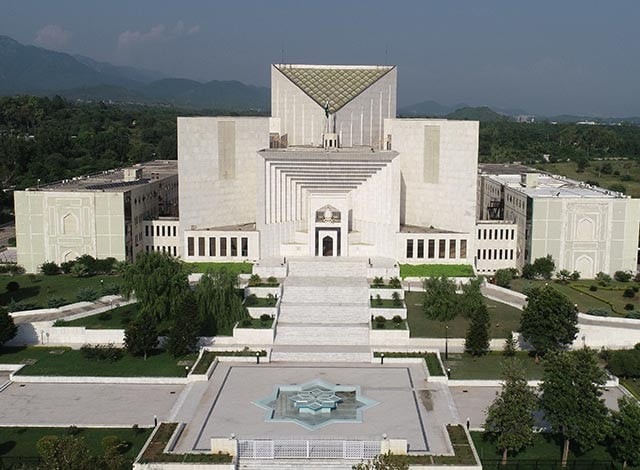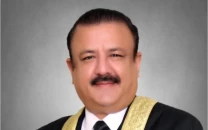SC hardens stance over contempt
Observers note CJP Isa's shift on press freedom since taking office

As the Supreme Court deliberates on contempt cases involving Senator Faisal Vawda and MNA Mustafa Kamal for their statements against the superior judiciary, the spotlight may soon shift to the media, already under pressure from powerful circles.
A three-judge bench of the apex court, led by Chief Justice of Pakistan (CJP) Qazi Faez Isa, has issued contempt notices to 34 TV channels for airing allegedly contemptuous press conferences by the two lawmakers.
During the hearing, CJP Isa expressed his concern over the TV channels broadcasting Vawda and Kamal's press conferences. Both Attorney General for Pakistan (AGP) Mansoor Awan and the Supreme Court Bar Association (SCBA) echoed CJP's worries regarding the media coverage.
Earlier, CJP Isa criticised TV channels for airing allegations of election rigging made by Rawalpindi’s commissioner without presenting the other side's version. Although CJP Isa responded to the commissioner’s allegations, which were later aired on TV channels, he highlighted the issue of biased reporting.
Justice Isa noted that he has been the target of malicious campaigns on social media but has assured that he will not retaliate. However, his remarks about media conduct may have a chilling effect on freedom of speech.
“The more you lie, the more it sells on social media,” CJP Isa remarked, highlighting his concerns about misinformation gaining traction online.
A 'change of heart'?
However, before assuming the mantle of chief justice, Justice Qazi Faez Isa was a staunch advocate for media independence.
In his speech at the oath-taking ceremony of the Press Association of Supreme Court (PASC) executive members on September 27, 2021, Justice Isa stated that anyone curtailing freedom of speech was an enemy of the people and the constitution and must be held accountable.
Justice Isa said, “A free and robust press is the backbone of a democracy. It serves both as a conscience and as a mirror. Without a free press, democracy quickly descends into an empty word, with its principles reduced to hollow ideas. Throughout history, totalitarian regimes have suppressed the press and imposed censorship.”
Justice Isa went on to state that violating fundamental rights was a violation of the Constitution. “In Pakistan, freedom of the press is stipulated as a Fundamental Right. Fundamental Rights enshrined in the Constitution are not favours which may be bestowed on the people,” he had asserted.
"Obedience to the Constitution is the inviolable obligation of every citizen; anyone curtailing it is an enemy of the people and of the Constitution, and must be held accountable."
CJP also asserted that when citizens fight for press freedom, they are fighting for their own liberties. He warned that surrendering the right to free speech or permitting press censorship will inevitably lead to the erosion of other guaranteed freedoms.
"A free press is vital to disseminate the voice of the people. It is also necessary to expose injustice, wrongdoing, corruption and highhandedness. Almighty Allah also enjoins that we speak up against injustice, wrongdoing and corruption; to countenance restrictions on free speech and expression offends an essential article of the Islamic faith," he added.
Justice Isa highlighted the findings of Reporters Without Borders, which publishes the World Press Freedom Index evaluating 180 countries.
"Its rankings reveal that we are not living up to what Pakistan’s founders wanted. In 2017 and 2018, Pakistan stood at the very low 139th position in terms of the Freedom Index, it then slipped to 142nd position in 2019 and then took the plunge to a shameful 145th position."
Justice Isa has consistently expressed serious concerns about the harassment of media persons in several judgments. In the Dharna case judgment, he discussed the role of state institutions in controlling the media.
In another suo motu case, he questioned the PEMRA notification banning TV programs on judges' conduct.
However, since becoming Chief Justice, Justice Isa has shown restraint regarding the actions of state institutions to curtail freedom of speech.
Recently, the government formed a Joint Investigation Team (JIT) to probe those aggressively criticizing the January 13 order, resulting in notices issued to several media persons. Journalist Asad Toor, for instance, was imprisoned for three weeks on false charges.
It is also noteworthy that X (formerly known as Twitter) was banned in Pakistan after the general elections, yet the Supreme Court did not take notice.
Recently, PEMRA issued a notification banning the broadcast of court proceedings on TV channels.
However, Justice Isa, in his remarks on Wednesday, questioned the legality of PEMRA's directive banning the coverage of court proceedings on TV, though no formal observation was made in the written order.
There is no doubt that CJP Isa has initiated live-streaming of court proceedings, but he still exercises discretion regarding which cases are live-streamed.
For example, there was no live-streaming during the last two hearings of the journalists' harassment case. Similarly, when PTI chief Imran Khan appeared for the NAB law amendments case, live-streaming was not allowed.
Although CJP Isa is addressing matters related to the harassment and attacks on journalists like Absar Alam, Matiullah Jan, and Asad Toor, the suo motu case regarding the murder of journalist Arshad Sharif is yet to be listed during his tenure.
As the government plans to introduce more draconian laws to control all forms of media, all eyes are on the superior judiciary led by CJP Isa to see how he will safeguard freedom of speech.


















COMMENTS
Comments are moderated and generally will be posted if they are on-topic and not abusive.
For more information, please see our Comments FAQ